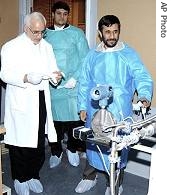2006年VOA标准英语-Iran Presses on With Nuclear Work Despite World
搜索关注在线英语听力室公众号:tingroom,领取免费英语资料大礼包。
(单词翻译)
By Gary Thomas
Washington
18 December 2006
While much of the world's attention focused on Iraq in 2006, its neighbor to the east also drew considerable scrutiny1. Iran pushed forward with a nuclear program that it says is for peaceful nuclear energy, but which critics say is a veiled attempt to become a nuclear weapons power. VOA correspondent Gary Thomas, who visited the country during the year, gives us this look at Iran in 2006.

Iran's President Mahmoud Ahmadinejad, right, and President of Atomic Energy Organization of Iran, Reza Aghazadeh, left, visit Natanz uranium enrichment facilities, 15 Feb 2006
Iranian officials broke the U.N. seals on their nuclear facility at Natanz last January, and in April, President Mahmoud Admadinejad proudly announced Iran had successfully enriched a small amount of uranium.
Even though the amount of enriched uranium Iran produced in 2006 was far less than what would be needed to construct nuclear weapons, the move nevertheless sparked great international concern about Iran's nuclear intentions.
European Union negotiators dangled2 incentives3 to get Iran to halt enrichment. President Bush offered to break with long-standing U.S. policy and join the European nations in direct talks with Iran if enrichment was stopped.
"I would hope they would make the choice that most of the free world wants them to make, which is there is no need to have a weapons program; there is no need to isolate4 your people; there's no need to continue this obstinance when it comes to your stated desires to have a nuclear weapon. It's not in your interest to do so," said Mr. Bush.
But those offers were rebuffed in Tehran. Iran has denied it seeks nuclear weapons and continues to insist it only wants peaceful nuclear energy.
On July 31, the U.N. Security Council called on Iran to suspend uranium enrichment within 30 days, but laid down no punishment for Tehran if it refused to comply. Former U.S. Defense5 Secretary William Cohen told VOA U.N. resolutions that are not backed up with action will not deter6 Iran.
"If you pass laws or resolutions that go unenforced, then you breed contempt for those resolutions or laws," explained Cohen. "That's why I think it's very, very important for Russia and China, who have signed on to the resolutions that say Iran should not get nuclear weapons, should join in a signal that they are prepared to enforce that resolution. That would then put the United States in the position of having some leverage7."
Throughout the year, the United States tried to muster8 support for tough sanctions at the U.N. Security Council. But Russia and China, which have significant trade and investment with Iran, have balked9 at any strong sanctions. Kenneth Katzman, an Iran analyst10 at the nonpartisan Congressional Research Service, says Iran's slow pace of nuclear development has given some leverage to opponents of significant sanctions.
"There is not a unity11 on this issue. And I think that part of it is that Iran's nuclear progress seems to have slowed, which I think has created less urgency to the issue, and has allowed Russia and China to say, 'Why are we punishing Iran now? They haven't really crossed the line dramatically to the point that we can say definitively12 that they have a nuclear, let's say, weapons ambition,'"noted Katzman.
Some analysts13 have advocated a military strike on Iran to destroy its nuclear program. Wayne White, a former senior regional State Department intelligence analyst now at the Middle East Institute, says that would be worse than Iran getting a nuclear weapon.
"In a region where it seems no good options exist on any issue, I frankly14 think that a military strike against that infrastructure15, which would be huge, would be much worse, in my view, than Iran actually getting a nuclear weapon," said White, "because I don't think Iran, despite the rhetoric16, would be hurling17 one or two crude [nuclear] devices in the direction of Israel, inviting18 a counterstrike that could make Iran glow in the dark."
But White is very concerned about the prospect19 of a Middle East arms race, particularly from Iran's neighbor Saudi Arabia, if Iran gets nuclear weapons.
"I would expect that following very closely behind Iran going nuclear, Saudi Arabia would go nuclear," he continued. "And people would wonder, well, how could that happen, they don't really have a [nuclear] program? They'll just buy bombs from Pakistan."
"And so I would assume the Saudis would get a few bombs, not to use as a deterrent20, frightened about what Iran could do, a few bombs just so they could put up a few billboards21 with arrows pointing to them, saying 'leave us alone,'" added analyst Wayne White.
Iran's tough position comes in large part, analysts say, from its hard-line president, Mahmoud Ahmadinejad. Elected in mid-2005, he has hardened international opposition22 to his regime by making threatening remarks about Israel and questioning the murder of six million Jews at the hands of the Nazis23 in World War II. At the end of 2006, Iran hosted a conference questioning the existence of the Holocaust24, which sparked international condemnation25 and revulsion.




